不规则形容词、副词比较级和最高级的形式变化及练习
形容词副词的比较级和最高级与用法
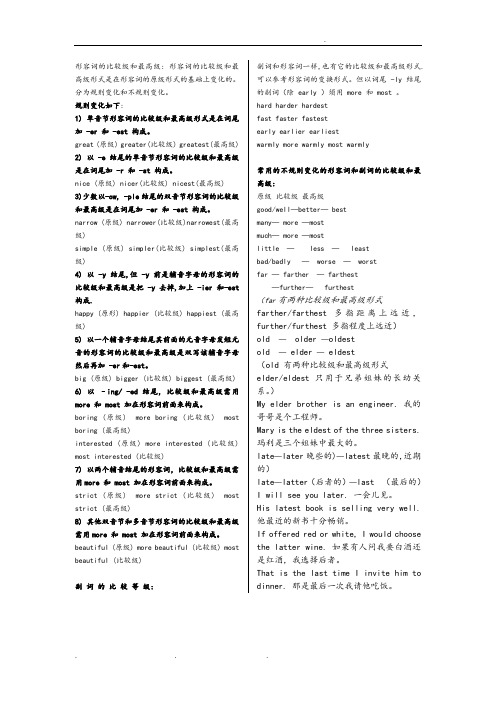
形容词的比较级和最高级: 形容词的比较级和最高级形式是在形容词的原级形式的基础上变化的。
分为规则变化和不规则变化。
规则变化如下:1) 单音节形容词的比较级和最高级形式是在词尾加 -er 和 -est 构成。
great (原级) greater(比较级) greatest(最高级) 2) 以 -e 结尾的单音节形容词的比较级和最高级是在词尾加 -r 和 -st 构成。
nice (原级) nicer(比较级) nicest(最高级)3)少数以-ow, -ple结尾的双音节形容词的比较级和最高级是在词尾加 -er 和 -est 构成。
narrow (原级) narrower(比较级)narrowest(最高级)simple (原级) simpler(比较级) simplest(最高级)4) 以 -y 结尾,但 -y 前是辅音字母的形容词的比较级和最高级是把 -y 去掉,加上 -ier 和-est 构成.happy (原形) happier (比较级) happiest (最高级)5) 以一个辅音字母结尾其前面的元音字母发短元音的形容词的比较级和最高级是双写该辅音字母然后再加 -er和-est。
big (原级) bigger (比较级) biggest (最高级) 6) 以–ing/ -ed结尾, 比较级和最高级需用more 和 most 加在形容词前面来构成。
boring (原级) more boring (比较级) most boring (最高级)interested (原级) more interested (比较级) most interested (比较级)7) 以两个辅音结尾的形容词,比较级和最高级需用more 和 most 加在形容词前面来构成。
strict (原级) more strict (比较级) most strict (最高级)8) 其他双音节和多音节形容词的比较级和最高级需用more 和 most 加在形容词前面来构成。
高三英语短文改错形容词和副词比较级和最高级错误练习题30题
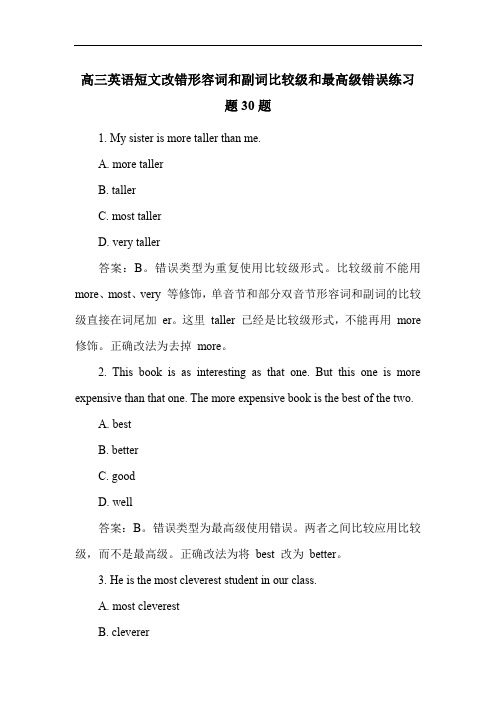
高三英语短文改错形容词和副词比较级和最高级错误练习题30题1. My sister is more taller than me.A. more tallerB. tallerC. most tallerD. very taller答案:B。
错误类型为重复使用比较级形式。
比较级前不能用more、most、very 等修饰,单音节和部分双音节形容词和副词的比较级直接在词尾加er。
这里taller 已经是比较级形式,不能再用more 修饰。
正确改法为去掉more。
2. This book is as interesting as that one. But this one is more expensive than that one. The more expensive book is the best of the two.A. bestB. betterC. goodD. well答案:B。
错误类型为最高级使用错误。
两者之间比较应用比较级,而不是最高级。
正确改法为将best 改为better。
3. He is the most cleverest student in our class.A. most cleverestB. clevererC. cleverestD. very clever答案:C。
错误类型为重复使用最高级形式。
clever 的最高级为cleverest,不能再用most 修饰。
正确改法为去掉most。
4. She sings more beautifully as her sister.A. more beautifullyB. as beautiful asC. more beautiful thanD. more beautiful as答案:A。
错误类型为比较级使用错误。
as…as 中间用形容词或副词原级,more beautifully 是比较级形式,不能与as 搭配。
八年级语法形容词和副词的比较级与最高级知识点整理及练习
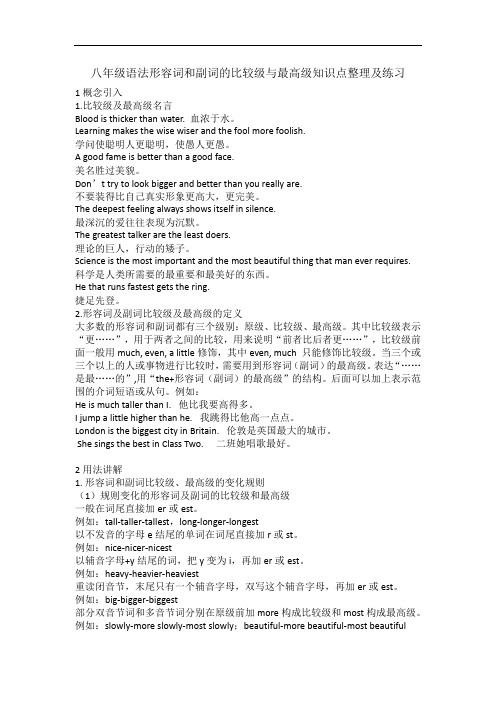
八年级语法形容词和副词的比较级与最高级知识点整理及练习1概念引入1.比较级及最高级名言Blood is thicker than water. 血浓于水。
Learning makes the wise wiser and the fool more foolish.学问使聪明人更聪明,使愚人更愚。
A good fame is better than a good face.美名胜过美貌。
Don’t try to look bigger and better than you really are.不要装得比自己真实形象更高大,更完美。
The deepest feeling always shows itself in silence.最深沉的爱往往表现为沉默。
The greatest talker are the least doers.理论的巨人,行动的矮子。
Science is the most important and the most beautiful thing that man ever requires.科学是人类所需要的最重要和最美好的东西。
He that runs fastest gets the ring.捷足先登。
2.形容词及副词比较级及最高级的定义大多数的形容词和副词都有三个级别:原级、比较级、最高级。
其中比较级表示“更……”,用于两者之间的比较,用来说明“前者比后者更……”,比较级前面一般用much, even, a little修饰,其中even, much 只能修饰比较级。
当三个或三个以上的人或事物进行比较时,需要用到形容词(副词)的最高级。
表达“……是最……的”,用“the+形容词(副词)的最高级”的结构。
后面可以加上表示范围的介词短语或从句。
例如:He is much taller than I. 他比我要高得多。
I jump a little higher than he. 我跳得比他高一点点。
形容词副词比较级和最高级练习题含答案
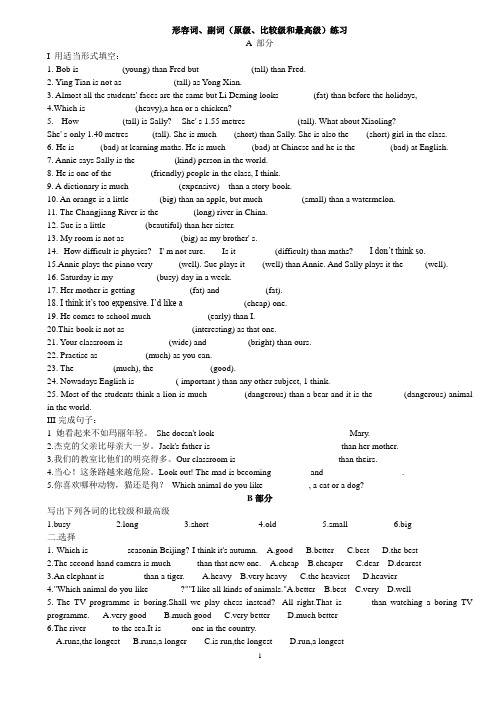
形容词、副词(原级、比较级和最高级)练习A 部分I 用适当形式填空:1. Bob is _________ (young) than Fred but ___________ (tall) than Fred.2. Ying Tian is not as ___________ (tall) as Yong Xian.3. Almost all the students' faces are the same but Li Deming looks _______ (fat) than before the holidays,4.Which is _________ (heavy),a hen or a chicken?5.-- How _________ (tall) is Sally? -- She' s 1.55 metres ________ (tall). What about Xiaoling?She' s only 1.40 metres _____(tall). She is much ___ (short) than Sally. She is also the ___ (short) girl in the class.6. He is _____ (bad) at learning maths. He is much _____ (bad) at Chinese and he is the _______ (bad) at English.7. Annie says Sally is the ________ (kind) person in the world.8. He is one of the_________(friendly) people in the class, I think.9. A dictionary is much _________ (expensive) than a story-book.10. An orange is a little ______ (big) than an apple, but much ________ (small) than a watermelon.11. The Changjiang River is the _______ (long) river in China.12. Sue is a little ________ (beautiful) than her sister.13. My room is not as _________ (big) as my brother' s.14.--How difficult is physics? --I' m not sure. -- Is it ________ (difficult) than maths? -- I don’t think so.15.Annie plays the piano very _____ (well). Sue plays it ___ (well) than Annie. And Sally plays it the ____ (well).16. Saturday is my _________ (busy) day in a week.17. Her mother is getting ____________(fat) and ________ (fat).18. I think it’s too expensive. I’d like a _____________ (cheap) one.19. He comes to school much ____________ (early) than I.20.This book is not as _____________ (interesting) as that one.21. Your classroom is __________(wide) and _________(bright) than ours.22. Practise as __________ (much) as you can.23. The ________ (much), the ____________ (good).24. Nowadays English is _________( important ) than any other subject, 1 think.25. Most of the students think a lion is much ________(dangerous) than a bear and it is the ______ (dangerous) animal in the world.III完成句子:1 她看起来不如玛丽年轻。
形容词与副词的比较级与最高级形式与用法
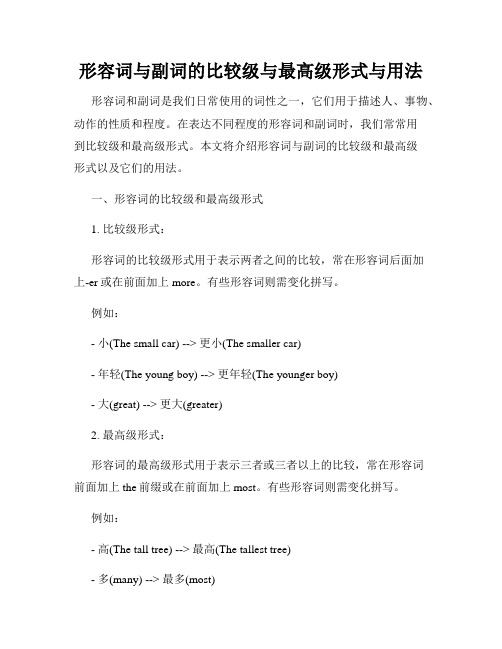
形容词与副词的比较级与最高级形式与用法形容词和副词是我们日常使用的词性之一,它们用于描述人、事物、动作的性质和程度。
在表达不同程度的形容词和副词时,我们常常用到比较级和最高级形式。
本文将介绍形容词与副词的比较级和最高级形式以及它们的用法。
一、形容词的比较级和最高级形式1. 比较级形式:形容词的比较级形式用于表示两者之间的比较,常在形容词后面加上-er或在前面加上more。
有些形容词则需变化拼写。
例如:- 小(The small car) --> 更小(The smaller car)- 年轻(The young boy) --> 更年轻(The younger boy)- 大(great) --> 更大(greater)2. 最高级形式:形容词的最高级形式用于表示三者或三者以上的比较,常在形容词前面加上the前缀或在前面加上most。
有些形容词则需变化拼写。
例如:- 高(The tall tree) --> 最高(The tallest tree)- 多(many) --> 最多(most)二、副词的比较级和最高级形式1. 比较级形式:副词的比较级形式与形容词相同,可以在后面加上-er或在前面加上more。
例如:- 快(He runs fast) --> 更快(He runs faster)- 悄悄地(Quietly) --> 更悄悄地(More quietly)2. 最高级形式:副词的最高级形式也与形容词相同,可以在前面加上most或在副词前面加上the前缀。
例如:- 很(nicely) --> 最(nicest)- 积极地(actively) --> 最积极地(the most actively)三、形容词和副词比较级与最高级的用法1. 更有多样性的比较:有些形容词和副词在比较级和最高级形式中有特殊变化。
例如:- 好(good) --> 更好(better) --> 最好(the best)- 多(多种方式)(many)--> 更多(more) --> 最多(the most)2. 不规则比较:有一些形容词和副词的比较级和最高级形式变化不规则,需特别注意。
形容词和副词的比较级和最高级
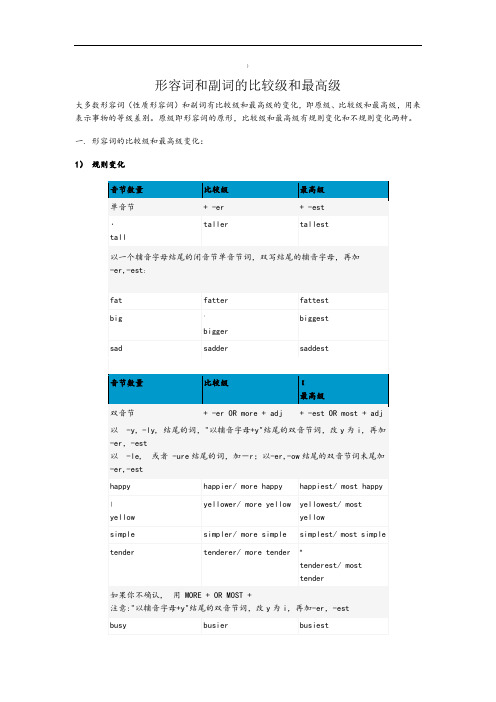
)形容词和副词的比较级和最高级大多数形容词(性质形容词)和副词有比较级和最高级的变化,即原级、比较级和最高级,用来表示事物的等级差别。
原级即形容词的原形,比较级和最高级有规则变化和不规则变化两种。
一. 形容词的比较级和最高级变化:1)规则变化音节数量比较级最高级more + adj most + adj…三个以上的音节important more important most importantexpensive more expensive `most expensive例如:a. A cat is fast, a tiger is faster but a cheetah is the fastestb. A car is heavy, a truck is heavier, but a train is the heaviestc. A park bench is comfortable, a restaurant chair is more comfortable, but a sofa is the most comfortable2)不规则变化原级比较级最高级bestgood}betterwell(健康的)badworse worst>ill(有病的)old older/elder oldest/eldestmuch/many more\mostlittle less leastfar farther/further farthest/furthest二. 副词的比较级和最高级变化:通常说来,副词的比较级和最高级与形容词的比较级最高级形式相同:、短副词后加-er or -est:副词比较级最高级hard harder the hardestlate》the latestlaterfast faster the fastest例如: Jim works harder than his brother.Everyone in the race ran fast, but John ran the fastest of all. 以-ly结尾的副词, 用 more +副词做比较级, most+副词做最高级:比较级最高级,副词quietly more quietly most quietlyslowly more slowly ]most slowly seriously more seriously most seriously例如: The teacher spoke more slowly to help us to understand.Could you sing more quietly please有的副词有不规则的比较级形式最高级副词~比较级badly worse worstfar farther/further farthest/furthestlittle less leastwell better best例如: The little boy ran further than his friends.You're driving worse today than yesterday !注意!有时候'most' 意味着'very':We were most grateful for your helpI am most impressed by this application.。
比较级与最高级的构成与用法详解形容词与副词的比较级与最高级形式
比较级与最高级的构成与用法详解形容词与副词的比较级与最高级形式在英语中,形容词与副词的比较级与最高级形式是用来比较两个或多个事物或人的程度或特征的。
了解并正确运用比较级与最高级形式对于学习英语和准确表达意思非常重要。
本文将详细解释形容词和副词的比较级与最高级的构成与用法。
一、形容词比较级与最高级的构成方式1. 形容词比较级的构成方式一般情况下,形容词的比较级是在原形后面加上“-er”,例如:- old(年老的)→ older(更年老的)- tall(高的)→ taller(更高的)如果形容词以“-e”结尾,只需要加上“-r”,例如:- large(大的)→ larger(更大的)以“辅音字母 + 单元音字母 + 辅音字母”结尾的形容词,则要双写结尾的辅音字母,并加上“-er”,例如:- big(大的)→ bigger(更大的)- hot(热的)→ hotter(更热的)2. 形容词最高级的构成方式形容词的最高级通常在原形后面加上“-est”,例如:- old(年老的)→ oldest(最年老的)- tall(高的)→ tallest(最高的)如果形容词以“-e”结尾,只需要加上“-st”,例如:- large(大的)→ largest(最大的)以“辅音字母 + 单元音字母 + 辅音字母”结尾的形容词,则要双写结尾的辅音字母,并加上“-est”,例如:- big(大的)→ biggest(最大的)- hot(热的)→ hottest(最热的)二、副词比较级与最高级的构成方式1. 副词比较级的构成方式大部分副词的比较级是在原形后面加上“-er”,例如:- fast(快速地)→ faster(更快地)- slowly(慢慢地)→ more slowly(更慢地)以“-ly”结尾的副词,直接在原形后面加上“-er”,例如:- quickly(快速地)→ quicker(更快地)2. 副词最高级的构成方式大部分副词的最高级是在原形后面加上“-est”,例如:- fast(快速地)→ fastest(最快地)- slowly(慢慢地)→ most slowly(最慢地)以“-ly”结尾的副词,直接在原形后面加上“-est”,例如:- quickly(快速地)→ quickest(最快地)三、形容词与副词比较级与最高级的用法1. 形容词与副词比较级的用法比较级常用于比较两个事物或人的程度,例如:- This book is more interesting than the last one.(这本书比上一本书更有趣。
初中英语形容词、副词比较级、最高级讲练
八年级上册英语形容词和副词的比较级和最高级绝大多数形容词有三种形式,原级,比较级和最高级, 以表示形容词说明的性质在程度上的不同。
一、形容词的原级: 形容词的原级形式就是词典中出现的形容词的原形。
例如: poor tall great glad bad二、比较级的定义:大多数的形容词都有三个级别:原级、比较级、最高级。
其中比较级表示“更……”,用于两者之间的比较,用来说明“前者比后者更……”,比较级前面一般用much, even, a little,a lot修饰,其中even, much 只能修饰比较级。
三、比较级和最高级的构成:(1)规则变化:①单音节和部分双音节的形容词比较级一般在词尾加-er,最高级在词尾加-este.g: calm--calmer—calmest tall--taller--tallest smart--smarter--smartest②以字母e结尾的比较级直接在词尾加-r,最高级加-st.e.g: nice--nicer -nicest fine--finer-finest large—larger--largest③以“辅音+y 结尾的词,变y为i,比较级加-er”,最高级加-est.e.g: early—earlier-earliest happy—happier-happiest busy—busier-busiest④以重读闭音节的单个辅音字母结尾的词,双写辅音字母,比较级加-er,最高级加-este.g: big—bigger-biggest thin—thinner-thinnest hot—hotter-hottest⑤多音节或部分双音节的形容词,比较级在原级前面加more,最高级在原级前加moste.g: popular--more popular—most popularimportant--more important—most important(2)不规则变化:少数形容词的比较级变化是不规则的:good—better--best bad/ill—worse--worst many/much—more--mostlittle—less--least far--farther/further—farthest/furthest old---older/elder—o ldest/eldest四、比较级的用法:(一)当两个人或事物(A和B)进行比较时,我们需要用到形容词(副词)的原级或者比较级1.表达“A和B一样”,用as…as的结构。
初中英语形容词比较级和最高级变形规律以及练习题与答案
规则变化如下: 1) 单音节形容词的比较级和最高级形式是在词尾加-er 和-est 构成。
great (原级) (比较级) (最高级) 2) 以-e 结尾的单音节形容词的比较级和最高级是在词尾加-r 和-st 构成。
wide (原级) (比较级) (最高级) 3)少数以-y, -er, -ow, -ble结尾的双音节形容词的比较级和最高级是在词尾加-er 和-est 构成。
clever(原级) (比较级) (最高级) 4) 以-y 结尾,但-y 前是辅音字母的形容词的比较级和最高级是把-y 去掉,加上-ier 和-est 构成. happy (原形) (比较级) (最高级) 5) 以一个辅音字母结尾其前面的元音字母发短元音的形容词的比较级和最高级是双写该辅音字母然后再加-er和-est。
big (原级) (比较级) (最高级) 6) 双音节和多音节形容词的比较级和最高级需用more 和most 加在形容词前面来构成。
beautiful (原级)? (比较级) (比较级) difficult (原级) (最高级) (最高级)形容词答案 1 . 1-5 D A C A B 16. 1-3 D A D 2. 1-6 C C B D A B 17. 1-3 B A C 3. 1-6 A A D B D D 18. 1-5 C D D D B 4. 1-4 B B C C 19. 1-4 A B A D 5. 1-3 A D A 20. 1-4 C C A C 6. 1-4 D A C C 21. 1-6 A A C B B D 7. 1-3 B C B 22. 1-4 C D A C 8. 1-3 A B A 23. 1-3 B C B 9 .1-5 B D B A B 24. 1-5 B C B B C 10. 1-6 C D C D D A 25. 1-3 B A A 11. 1-3 C B D 26. 1-3 C C B 12. 1-4 C A B D 27. 1-3 B A D 13. 1-3 A B B 28. 1-3 B D C 14. 1-5 C C B D D 29. 1-3 B D C 15. 1-5 C C B B D 30. 1-2 A C 英语语法之形容词比较级和最高级练习题 1. This box is___ that one.A. heavy thanB. so heavy thanC. heavier asD. as heavy as 2 When we speak to people, we should be ' .A. as polite as possibleB. as polite as possiblyC. as politely as possibleD. as politely as possibly 3 This book is____ that one, but____ than that one. A. as difficult as; expensive B. as more difficult as; more expensive C. as difficult as; more expensive D. more difficult as; as expensive 4 I think the story is not so ___ as that one.A. interestingB. interestedC. more interestingD. most interesting 5 His father began to work____ he was seven years old.A. as old asB. as early asC. sinceD. while 2 1. I think science is _ than Japanese.A. much importantB. importantC. much more importantD. more much important ( ) 2 This pencil is___ than that one. ^. longest B. long C. longer D. as long ( ) 3 My mother is no ___ young.A. shorterB. longerC. littleD. few ( ) 4 These children are ____ this year than they were last year.A. more tallB. more tallerC. very tallerD. much taller ( ) 5 It was very hot yesterday, but it is___ today.A. even hotterB. more hotterC. much more hotD. much hot 6. Mrs Black has got____ instead of getting any better.A. more badB. a little worseC. much badlyD. a lot of worse 3 ( ) 1 When we arrived, we found the meeting room crowded with___ students.A. quite a fewB. only a fewC. fewD. a few quite 2 The house is small for a family of six.A. much tooB. too muchC. very muchD.so 3 Through the window we can see nothing but ____ buildings.A. tall very manyB. very many tallC. very tall manyD. many very tall 4 -What's your brother like? -He is___.A. a driverB. very tallC. my friendD. at school 5 The jacket was so___ that he decided to buy it. ,A. muchB. littleC. expensiveD. cheapl 6 Our classroom is____ larger than theirs.A. moreB. quiteC. veryD. much 4 ( ) 1 The earth is about____ as the moon.A. as fifty time bigB. fifty times as bigC. as big fifty timesD. fifty as times big ( ) 2 Your room is mine.A. twice as large thanB. twice the size ofC. bigger twice thanD. as twice large as ( ) 3 Your room is ___ than mine.A. three time bigB. three times bigC. three times biggerD. bigger three times ( ) 4 His father is____than his mother. ;A. older four yearsB. as four years olderC. four years olderD. bigger four years 5 ( ) 1 Maths is more popular than____.A. any other subjectB. all the subjectsC. any subjectD. other subject ( ) 2 China is larger than ____ in Africa (^W).A. any other countryB. other countriesC. the other country J 1%D. any country ( ) 3 Tom is stronger than ___ in his class.A. any other boyB. any boysC. any boyD. other boy 6 ( ) 1 When spring comes, it gets____.A. warm and warmB. colder and colderC. warmer and warmerD. shorter and shorter ) 2 By and by, ____ students in our class came to like English. A. more and more B. much and much C. many and many D. less and least ) 3 At last he began to cry ___.A. hard and hardB. more hard and more hardC. harder and harderD. less hard and less harder ) 4 When spring comes the days get ____ and nights ____.A. short; longB. long; shortC. longer; shorterD. shorter; longer 7 1___ I look at the picture, ____ I like it.A. The best; the moreB. The more; the lessC. The more; lessD. More; the more 2 ___ he read the book, ____ he got in it. A. The more; the more interestingB. The less; the more interestingC. The more; the more interestedD. More; more interested3 ___ you come back, _____ it will be. A, The quicker; the best B. The sooner; the better C. Faster; the better D. The sooner; better 8 1 I like___ one of the two books.A. the olderB. oldestC. the oldestD. older ( )2 Which is___country, China or Japan?A. the largeB. the largerC. largerD. largest ( ) 3 Of the two cups, he bought .A. the smallerB. the smallestC. small D: smaller 9 ( ) 1 Which do you like ___, tea or coffee?A. wellB. betterC. bestD. most ( ) 2 This work is ____ for me than for you.A. difficultB. most difficultC. much difficultD. more difficult ( ) 3 Which do you think tastes ____, the chicken or the fish?A. goodB. betterC. bestD. well ( ) 4 The Great Pyramid is about 137 metres high today, but it was onceA. higherB. highestC. high tooD. more high ( ) 5 Don't you think it ______ not to write the letter? A^^ A. well , B. better C. best D. good 10 ( ) 1 Who jumped____of all?A. farB. fartherC. farthestD. the most far ( ) 2 Li Lei is___ student in our class.A. tallB. tallerC. tallestD. the tallest ( ) 3 The fifth orange is____ of all. Give it to that small child.A. bigB. biggerC. the biggerD. the biggest ( )4 Who is---of you three?A. the oldestB. much olderC. oldestD. older 11 ( ) 1 Tom is one of ____ boys in our class.A. tallestB. tallerC. the tallest B. the tall ( ) 2 English is one of____ spoken in the world.A. the important languagesB. the most important languagesC. most important languageD. the most important language ( ) 3 Beijing is one of____ in China.A. the largest city r ';B. the large citiesC. the larger citiesD. the largest cities 12 1. Most of the woods ____ been taken good care of.A. areB. isC. hasD. have 2 ___ like playing football and watching TV.A. Most boysB. Most of theyC. Most boyD. More of they 3 ___ are here watering the flowers here.A. SomeB. Some of the boysC. Some boyD. Some of boys 4 ___ haven't been to American.A. Most themB. Most theyC. More of themD. Most of them 13 1 ___ is more beautiful than roses.A. No other flowerB. No another flowerC. Not other flowerD. Not all flowers 2 The tree is ___ in the garden.A. the tallerB. the tallestC. taller than of-allD. tall. 3 Mary studies harder in her class.A. as any oneB. than any other girlC. than the otherD. than anyone 14 1 Which is___, Li Lei or Wu Tong?A. strongB. strongestC. strongerD. the strongest 2 Which language is____, English, French or Japanese? A. easy B. the most easy C. the easiest o D. much more easy 3 Which is____interesting, science, maths or English?A. moreB. the mostC. veryD. too 4 Which city is____, Beijing, Shanghai or Fuzhou? A. beautiful B. more beautiful C. much more beautiful D. the most beautiful 5 Which month is____, June, July or August?A. hotB. hotterC. hottestD. the hottest 15 1 Do you have ____ to tell us?A. something newB. new somethingC. anything newD. new anything 2 Mike, I have____to tell you.A. important somethingB. important anythingC. something important ,D. anything important 3 There is ___ in today's newspaper.A. interesting somethingB. nothing interestingC. interesting anythingD. anything interesting 4 -Is Mrs Brown badly ill? -No, ____. Only a little cold.A. quite wellB. nothing seriousC. not worryD. anything serious ) 5 Come here, I have____ to tell you.A. interesting somethingB. anything interestingC. nothing interestingD. something interesting 16 ( ) 1. I'm not ___ to lift the heavy box.A. short enoughB. enough tallC. health enoughD. strong enough ( ) 2 The girl works hard ___ to pass the exam.A. enoughB. tooC. stillD. yet ( ) 3 He has____ to think it over. . A. many time B. times C. time enough D, enough time 17 ( ) 1 "Do you want____A. else anythingB. anything elseC. other anythingD. else something ( ) 2 Have you seen ___ in the room?A. anyone elseB. else anyoneC. anyone otherD. everyone else ( ) 3 ___ would like to go to the park with me?A. Whom elseB. What elseC. Who elseD. Else who 18 ( ) 1 Wei Fang is only six, but she speaks English____ her mother. A. as good as B. as better as C. as well as D. as best as ( ) 2 She was sick yesterday, but she is____ to go to school today. A. enough good B. goodenough C. enough well D. well enough ( ) 3 This kind of book is-______ for the children to read.A. enough well 'B. enough goodC. well enoughD. good enough ) 4 -Are you feeling ____? -Yes, I'm fine now.A. quite goodB. quite betterC. any wellD. any better ) 5 This shirt is no good. That one is evenA. betterB. worseC. wellD. worst 19 ( ) 1 We have never seen___ interesting films.A. suchB. such anC. soD. such a ( ) 2 Don't read :' books ___ you can't understand.A. as; suchB. such; asC. same; asD. as; as ( ) 3 This is____ book___ I'd like to read once more.A. such an interesting; thatB. so interesting; thatC. such an interesting; asD. a so interesting; as ( ) 4 We haven't seen ____ play.A. so wonderfulB. a so wonderfulC. such wonderfulD. such a wonderful 20 ( ) 1 I am twelve; Mike is fourteen; Mary is thirteen. So Mike is the ___ of the three.A. oldB. olderC. oldestD. the oldest ( ) 2 My ____ brother is three years ____ than I.A. elder; elderB. older; oldestC. elder; olderD. older; elder ( ) 3 His ____ son often go to see him on Sunday.A. eldestB. olderC. the eldestD. the older ( ) 4 He is two years ___ than I.A. elderB. smallerC. youngerD. less 21 ( ) 1 I think the book is very____.A. interestingB. interestedC. interestD. interests ( ) 2 They were very ____ to see each other again.A. pleasedB. surprisingC. happily -D. angrily ( ) 3 She is very____ the news.A. surprise inB. surprise withC. surprised atD. surprised for ( ) 4 The boys are ___ computers.A. interesting inB. interestedC. interesting aboutD. interested about ( ) 5 -How does Kate like her new work? -She____ with the hours.A. can't satisfyB. isn't satisfiedC. doesn't satisfy D- hasn't satisfied ( ) 6 The man was not ___ when he heard the ___ words.A. frightening; frighteningB. frightened; frightenedC. frightening; frightenedD. frightened; frightening 22 ( ) 1 Helen isn't a____ friend of mine. I feel___ sorry for her.A. true; trueB. truly; trueC. true; trulyD. truly" truly ( ) 2 I'm sorry. I'm late. My watch is a few minutes____.A. slowerB. slowlyC. more slowlyD. slow ( ) 3 The song sounds___.A. sweetB. nicelyC. wellD. moved ( ) 4 The ship sank____ under the sea.A. deeplyB. depthC. deepD. more deep 23 ( ) 1 ___ helped a lot in our country.A. The blind isB. The blind areC. The blinds isD. Blind are ( ) 2 ___ should study hard for their work.A. YoungB. The young manC. The youngD. The young girl ( ) 3 ___ a happy life in China.A. The old man liveB. The old liveC. The old is livingD. Old live 24 1 I don't feel very.A. terriblyB. wellC. goodD. badly ) 2 Looking___ at his mother, the little boy looked____.A. happy; goodB. happy; wellC. sadly; sadD. sad; sadly ( ) 3 Mother doesn't feel ___ today.A. goodB. wellC. niceD. health ( ) 4 In summer eggs will go___ easily.A. terriblyB. terribleC. badlyD. bad ( ) 5 Jim does morning exercises every day, so he looks very ___.A. tiredB. goodC. wellD. happy 25 ( ) 1 The___ boy was taken to the nearest hospital.A. illB. sickC. goodD. clever ( ) 2 We are___ of the work.A. illB. sickC. fullD. filled 3 He has not been at school, because he is___.A. illB. wellC. fineD. nice 26 ( ) 1 At last it made them___.A. happilyB. quicklyC. friendlyD. slowly ( ) 2 We had a____ meal yesterday evening.A. livelyB. likelyC. lovelyD. love ( ) 3 It is raining hard. He is____ to be late.A. lovelyB. likely'C. livelyD. friendly 27 ( ) I This book is very good. It___ buying.A. worthsB. is worthC. worthD. is worthing 2 The film is very interesting. It is worth ____ a second time.A. seeingB. seeC. to seeD. seen ( ) 3 Hike___, but 1 dislike ___.A. skating; swimB. skate; swimmingC. to skate; skateD. skating; swimming 28 ( ) 1 I have worked on the problem, so I am feeling tired and___.A. asleepB. sleepyC. sleepingD. sleep ( ) 2 He lay on the floor and fell ___.A. sleepyB. sleepingC. awakeD. asleep ( ) 3 Who is ____ in the next room?A. asleepB. sleepC. sleepingD. sleepy 29 ( ) 1 We have___time to do it better.A. notB. noC. no aD. not a ( ) 2 We have ____ water to wash clothes.A. not anyB. no aC. not aD. no any ( ) 3 I only want to say that I am____ fool.A. not anyB. no aC. not aD. no any 30 ( ) 1 Mary's mother bought a____ coat for her yesterday. A. new big blue silk B. new blue silk big C. new silk blue big D. blue silk new big ( ) 2 My hometown has____bridge.A. a stone old fineB. an old stone fineC. a fine old stoneD. an old fine stone 31 1 That's really silly _A. of you to say soB. for you to say soC. of you saying soD. for you saying so ( ) 2 It's important ___ exercise every morning.A. of you to takeB. for you to takeC. of you takingD. for you 31. 1-2 A B。
形容词副词的比较级最高级以及练习题
形容词比较级(一)英语形容词、副词比较级的构成英语形容词比较等级有三个:原级,比较级和最高级。
形容词比较等级形式变化有规则的和不规则的两种。
1、规则变化1)单音节词末尾加-er (比较级人-est (最高级)5)其它双音节和多音节词皆在前面加单词 【例】careful difficult(距离)(程度)注:有些形容词一般没有比较等级。
如:right, wrong, woolen 等 (二)形容词/副词的比较级的用法:【例】原级 比较级 最高级 great greater greatestsmall smaller smallestclean cleaner cleanest 2)单音节如以 e 结屋, 只加-r (比较级),-st (最高级) 【例】wide wider widest 3)闭音节单音节词如末尾只有一个辅音字每,须先双写这个辅音字母, -est (最高级)【例】big bigger biggest hothotter hottestred redder reddest再加-er (比较级),4)少数以 -y 结尾的词, ■Sto【例】clever-ble 结尾的双音节词,末尾加-er (比较级人-est (最高级)。
以-er> ow, 如-y 前是辅音字母,则变y 为-i,再加-ei •和-esto 以-e 结尾的词只加-r 和 cleverer cleverest narrow ableeasynarrower abler easiernarrowest ablest (不常用) easiestmore 和 most 。
more careful most careful more difficult most difficultdelicious 、不规则变化原级 good/well bad many/much little far more delicious most delicious 比较级better worse 最高级 best worst most leastmorelessfarther/further farthest/furthest1、 原级(同级)比较2 as ・・・as …;not as (so) •••as*"We' 11 give you as much help as we can.She isn' t as (so)active in sports as before.2、 可修饰比较级的词2 much, a little, even, far, a lot »ratherHe made fewer mistakes than I did. He is even richer than L3、 不含“tlum”,但蕴含着比较意义。
- 1、下载文档前请自行甄别文档内容的完整性,平台不提供额外的编辑、内容补充、找答案等附加服务。
- 2、"仅部分预览"的文档,不可在线预览部分如存在完整性等问题,可反馈申请退款(可完整预览的文档不适用该条件!)。
- 3、如文档侵犯您的权益,请联系客服反馈,我们会尽快为您处理(人工客服工作时间:9:00-18:30)。
不规则形容词、副词比较级和最高级的形式变化(必背)good-----better------best 好的well------better------best 身体好的bad------worse------worst 坏的ill--------worse-------worst 病的many--------more------most 许多much----- -more--------most许多few------less-------least 少数几个little-------less------least 少数一点儿far------further------furthest 更进一步,程度far------farther------farthest 更远,路程old-------older------oldest 年老的(指年纪)old------elder-------eldest 年老的(指兄弟姐妹的排行)巩固练习:一、写出下列词的比较级和最高级单间节或双音节,比较级 + er,slow__________ ___________ long__________ ___________weak__________ ___________short__________ ___________tall__________ ___________ high__________ ___________small__________ ___________ loud__________ ___________light__________ ___________ fast__________ ___________bright__________ _________ quick__________ ___________ strong__________ ___________ clever__________ ___________ cheap___________ ___________ old____________ ____________ clean ___________ ___________ young ___________ ___________ near ___________ ___________ cold ___________ ___________ warm ________ _________ cool ________ _________hard________ _________ black________ _________soft________ _________ new________ _________low__________ __________2、以e结尾的词,比较级+r,最高级+stlarge ________ _________ nice _________ _________ cute ________ _________ fine _________ _________late ________ _________ huge _________ _________blue ________ _________ white _________ _________ brave_______ __________ polite_________ __________rude_________ _________ quite_________ ___________3、以辅音字母+y结尾的变y为i+er或esthappy________ _________ easy ________ _________ heavy________ _________ angry________ _________ hungry________ _________ funny________ _________ early________ _________ dry________ ________lazy_________ __________ noisy__________ __________ dirty_________ __________ windy__________ __________ cloudy _________ _________ busy___________ ___________ healthy__________ _________ pretty ______________ _________ funny _________ ___________4、双写最后一个辅音字母+er或esthot ________ _________ big ________ _________ red ________ _________ thin ________ _________ fat ________ _________ wet ________ _________5、多音节和部分双音节+more构成比较级,+the most构成最高级例; beautiful ----- more beautiful ------ the most beautifulinteresting ________________ __________________frightening ________________ __________________exciting ________________ __________________slowly________________ __________________happily________________ __________________delicious ________________ __________________expensive ________________ __________________important ________________ __________________careful ________________ __________________difficult ________________ __________________quickly________________ __________________friendly ________________ __________________handsome ________________ __________________6、不规则形容词比较级和最高级good ________________ __________________well________________ __________________many________________ __________________much________________ __________________few________________ __________________little________________ __________________old________________ __________________old________________ __________________bad________________ __________________ill________________ __________________far________________ __________________far________________ _________________二、根据句意填入单词的正确形式。
1.My brother is two years _______________ (old) than me.2. Is your sister ______________ (young) than you? Yes, she is.3. Who is _______________ (thin),you or Helen? Helen is.4. Whose pencil-box is ____________ (big), yours or hers? Hers is.5.Ben jumps ____________ (high) than some of the boys in his class.6.Does Nancy sing _______________ (well) than Helen? Yes, she does.7.My eyes are _______________(big) than hers.8.Which is _______________ (heavy), the elephant or the pig?9.Who gets up ______________ (early), Tim or Tom?10.Do the girls get up____________(early) than the boys? No, they _______ _____. 11.Jim runs ___________ (slow). But Ben runs ___________(slow).12. The Earth is ___________ (big) than the moon.13. The sun is ____________ (bright) than the other stars.14. John is strong this year. He is ___________ (strong) than last year.15. Lhasa is _______ __________ (high) city in China.16. John is one of ________ __________ (tall) and ____________ (heavy) students.17. Today is _________ than yesterday.18. Mount Qomolangma is __________ ____________ (high) mountain in the world.19. My dog is _________ (small). Your dog is _________ (big). My dog is _________ (small ) than yours.20. This game is ___________ ____________ (interesting) than that game.21. Noodles are ___________ _____________ (delicious) than bread.22. Chinese is _________ ______________ (difficult) than English.23. My skirt is _________ ______________ (expensive) than hers.24. Shenzhen is one of _______ _________ ___________(beautiful) cities in China.25. Monkey King is one of _____ _______ _____________(exciting) stories.26. She is _____ _______ ___________ (careful) girl in our class.。
